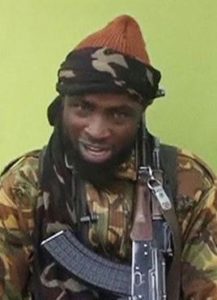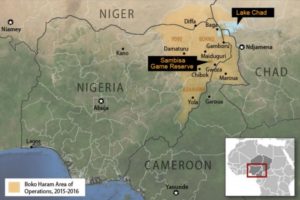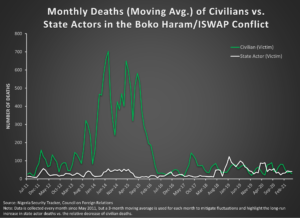 A Boko Haram flag at the Bosso border post between Nigeria & Niger.
A Boko Haram flag at the Bosso border post between Nigeria & Niger.
Nigeria: Boko Haram’s Leader Is Likely Dead, Now What?
After eluding death at least 5 times, Abubakar Shekau, the infamous leader of the jihadist group Boko Haram in Nigeria, is rumored to have finally died last month.
Yet it was not the Nigerian military that finished the job; it was the Islamic State West Africa Province (ISWAP), an ISIL-affiliated terrorist group. With ISWAP decapitating Boko Haram, this underscores a major shift that affects regional stability and US interests.
A Glance at the Past: Boko Haram & ISWAP
Under Shekau, Boko Haram evolved into one of the deadliest Islamist armed groups. Known for terrorizing Nigerian civilian and state actors alike, by 2014 Boko Haram carved itself a territory in northeast Nigeria. It gained international infamy, and even bombed a Western target in Abuja.
In 2015, Shekau was pressured into pledging his allegiance to ISIL, and Boko Haram rebranded as ISWAP. In turn, ISIL provided funding, military training, and advising. However, disputes over leadership, attacks on civilians, and ideology fractured the group; a few defectors took ISWAP to Lake Chad with ISIL support, while Shekau remained in Sambisa under the original name, Boko Haram.
What’s Next?
Local reports indicate ISWAP is consolidating its gains. ISWAP allegedly appointed its leader as Shekau’s “replacement” and arrested 30 commanders loyal to the deceased leader. Evidently, ISWAP is interested in becoming the main source of strength in northeast Nigeria.
Unlike its Boko Haram predecessors, ISWAP’s jihadist proto-state has provided communities with some semblance of security, justice, administration, and service otherwise missing. So while Shekau terrorized villages, ISWAP also digs wells, provides healthcare and [its version of Islamic] education, facilitates commercial activity, and monitors crime. And as Boko Haram targeted civilians, ISWAP pursues state actors, sometimes disciplining personnel who abuse civilians.
ISWAP is no savior: it acts with extraordinary violence, cutting off thieves’ hands and attacking civilian centers. But ISWAP provides some order when there was none. With a negligent government and Boko Haram’s cold-blooded nature towards civilians, residents’ alternatives are limited.
Implications for US National Security Strategy
Equipped with a +5,000-man armed force and deep ties to ISIS, ISWAP’s roots in communities makes it formidable. Even with civilian and multinational help, the Nigerian government couldn’t defeat Boko Haram; the battle with ISWAP will be no easier.
Unfortunately, this has serious implications for America.
The most populous African nation, Nigeria is expected to become the 3rd largest worldwide. Additionally, Nigeria is an OPEC member, producing over 1.7 million bbl/day of crude. From American soft power in West Africa to export markets and global oil prices, a stable Nigeria is in America’s best interest, especially as other great powers vie for influence on the continent. But whether it’s from an attack by ISWAP, or a response by Abuja that fuels unrest, there’s major room for error.
The danger extends beyond Nigeria’s borders. Lake Chad is in the Sahel, a vast strip across Africa with conditions ideal for extremism: vulnerable Muslim populations, poverty, and government absence. So as ISIL loses ground in the Levant, significant gains in the Sahel by ISIL-affiliated groups can be seen as “ground-zero” for another IS caliphate. This could inspire “lone wolf” attacks, or push regionally-“aspirational” groups to launch a transatlantic strike.
So, while ISWAP isn’t public enemy #1, Washington still has an interest in suppressing its potency. The key here is targeting sources of extremism, namely by axing ISWAP’s relationship with communities. Unfortunately, much of this remains in Nigeria’s hands, which needs reforms on corruption, democracy, and economic mismanagement while strengthening civic institutions.
Yet as the government’s hardline militaristic approach towards residents in northeast Nigeria shows little effort to develop an administrative presence and build trust, America can still play a role. In 2020, the US provided over $845 million to Nigeria for humanitarian and economic aid. It also trains security forces on counter-extremism efforts that respectfully engage with locals.
America should continue a dynamic counterterrorism strategy against ISWAP. It should resume supporting liberal reforms and programs in Nigeria that integrate alienated communities. Furthermore, the US could redirect aid from Abuja into NGOs to support the region; in turn, these NGOs could serve as more credible voices to help increase Nigerian administrative presence and mend the government’s relationship with locals.
Additionally, America needs to continue assisting Nigeria in [strictly] counterterror military capacity-building. Along with the training the Nigerian military on sustainable, human-focused tactics, the Pentagon should maintain a robust intelligence operation in the region. These operatives can provide intelligence training to the military in order to increase targeting accuracy against terrorists and reduce risk to civilians. Finally, the US can take a greater advisory role in building coordination among the advantageous, yet disjointed, Multinational Joint Task Force.
Featured Image Photo Credit: EU Civil Protection and Humanitarian Aid








